


THE NUMEROUS PYRAMIDS









Front Game Rules ($10K, $20K, and $25K versions) | ||
| Two teams of one celebrity and one civilian compete against each other in a game of word association. In each match, a pyramid-shaped board of six categories was offered to each team (The challenger's team started play), each one with a list of seven items that fit into a specific category. For instance, for the board on the right, the category "Man to Man" might be people whose last names end in "-man", or "Parlez-Vous Francais?" may be things that are French. | 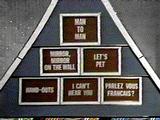
| |
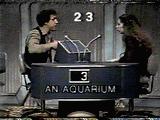
| In each subject, one member of the team has to describe the seven objects in that category to his/her partner in 30 seconds or less. Each correct answer is worth one point. The clue-giver can talk, act, and do just about anything short of saying the answer itself. If such a mistake is made, a cuckoo sounds and that word is forfeited. The clue-giver can also pass on any word if desired, but once a word is passed on no further description can be made of it. (The word still remained active, though, and if guessed, the team still got credit.) The celebrities gave clues in the first round, the civilians gave in the second, and the team could choose who would give in all subsequent rounds of the game. | |
| After each team has played three subjects, the team with the highest score wins the game and advances to the Winner's Circle. A $1,000 bonus was also given for a perfect score of 21. In the event of a tie, further subjects would be played, each being seven words that begin with a particular letter. (In the example on the left, they start with O.) The tiebreaker continues until one team outscores the other. | 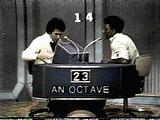
| |
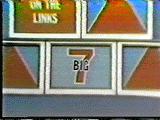
| In the $20K and $25K versions of the show, one subject during the show had hidden behind it a "Big 7." This was a bonus card which would win $500 for the player if the team managed to get all 7 words in under 30 seconds. In the $25K versions, this would be worth a merchandise prize, possibly even a new car. | 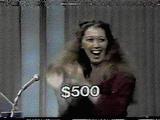
|
End Game - "The Winner's Circle" ($10K, $20K, and $25K versions) | ||
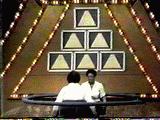
| In the endgame, one member of the team faced another pyramid board while the other faced away from it (Usually the celebrity gave clues, but occasionally the civvie did). In the endgame, the object was to give a list of items that fit in a particular subject ("Things you listen to" in the example on the right). In this stage of the game, the judges were much more constrictive as to what was or wasn't legal. Prepositional phrases, synonyms to a keyword, and overly long clues were prohibited, and if used would buzz both the subject and your shot at the big money. | 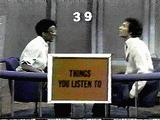
|
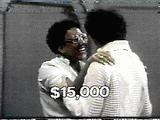
| The bottom three subjects on the pyramid were $50 apiece. The middle two were each worth $100, and the top was $200. (In the $25K versions, these payoffs were upped to $100/$200/$500.) Successfully clearing the board in under 60 seconds won the shows payoffs, which stand as follows: | 
|
| $10K Pyramid: $10,000 on every trip to the Winner's Circle.
$20K Pyramid: $10,000 on your first trip, $15,000 on your second, and $20,000 thereafter. $25K Pyramid: $10,000 on your first trip, $25,000 on your second trip of the same show. If successful in the $10K and $20K versions, the champion retired undefeated. If not, the player returned to face a new opponent (and was paired up with the other celebrity). In the $25K version, both players stayed for the whole show, and were only on for that episode. | ||
Rules ($50K version) | ||
| Play was very similar to the $25K version, with a couple twists. First, the clock for the subjects counted up, not down. This was to time each team's performance in the front game. At the end of the week, the player that conveyed all 7 words in a subject in the shortest amount of time won a bonus prize and would return later on to play in a tournament for a grand prize of $50,000. In the Winner's Circle, you would win $5,000 on your first trip and $10,000 on your second trip of the same show. Both players stayed for the whole show, but did not return the next day.
| ||
Front Game Rules (New $25K and $100K versions) | ||
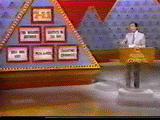
| In this version of the Pyramid, the play was just the same as the original version, only with different bonuses. Each game of the show had a different bonus. In the first game of the day, the bonus was the "7-11" which was worth $1,100 if all 7 words were identified. (Early in the use of this bonus, players were given a choice of $50 for each word or $1,100 for all 7 in an all-or-nothing manner - but most chose the latter anyway). In the second match of the show, the "Mystery 7" was the bonus, and was worth a merchadise prize. However, the "common bond" of the subject was withheld until after the category was played, theoretically making it harder. (When the show premiered, Mystery 7s weren't hidden, but merely included up front as one of the six subjects. Later on, when the prize attached to the subject enticed nearly every team to play it right away, it was concealed behind the board like the 7-11.) | 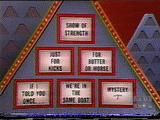
|
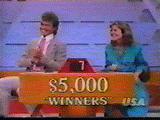
| The tiebreaker was also changed. Rather than play tiebreaks ad infinitum, Each player was given one subject of words that start with a particular letter. The game went to the team that scored the most points, OR got the same score in a faster time (in the case of perfect 7's.) Another bonus was enabled if the game went to a 21-21 tie; the player that broke the tie won an extra $5,000. | |
End Game Rules (New $25K and $100K versions) | ||
| The rules for the Winner's Circle were exactly the same as before: 6 subjects, 60 seconds. The only difference this time around was in the payoffs; like the original Cullen version, you'd play for $10,000 on your first visit and $25,000 on your second visit of the same show. Also, subjects increased in value to $50 for the first, $100 for the second, $150 for the third, and so on until the last subject worth $300. The New $25K and $100K versions of the show also introduced the concept of "Score" money. After two games were played, the player who had accumulated the most money in the Winner's Circle would return the next day. If there was a tie, both players returned. Any bonuses won in the front game were not included into the totals (something Dick would repeat time and time again). | 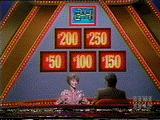
| |
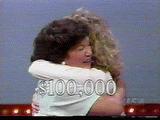
| What made the $100K version different was the tournament. After a period of about six weeks, the three players who conquered the Winner's Circle in the shortest time would return for a shot at $100,000. During the tournament, two out of the three players would take part in a show while the other player waited in the wings. The low scorer of the day would be replaced on the next episode by the odd man out. The tournament continued (sometimes going on for weeks) until one player managed to beat the Winner's Circle again, winning the $100,000 grand prize. It should also be noted that during the tournament, the only active bonus was the $5,000 for a perfect tiebreak. | |
| When the show returned in 1991, two new bonuses were introduced in the front game: "Gamble for a Grand," in which a team can elect to convey the 7 words in less than 25 seconds, winning $1,000 if successful; and "Double Trouble," a set of two subjects (each team would have to pick one) bearing 7 two-word (but otherwise unrelated) phrases, and winning $500 if completed in an expanded time limit of 45 seconds.
| ||
NotesEasily the most popular of Bob Stewart's shows, the origin of Pyramid is a notorious one among game show fans. Cultivated under the titles Cash on the Line and The $10,000 Sweep, the original concept of the Winner's Circle was supposed to have 10 subjects. When somebody figured out that 10 subjects in 60 seconds was downright impossible, the folks at CBS saw it fit to cover the lower tier of trilons with a slab of plywood. Despite looking horribly ugly (as one might imagine), it remained there for the entire first season. | ||
This, my friends, is the ultimate game show. I'll give the early versions leway, as the format was still finding itself for a while until the 80's. The $10K version was a victim of celebrities who had no idea how to play the frontgame. The $20K version was pretty good, and the original $25K version was also a nice concept, although Bill Cullen's hosting of it reminds me of Tom Kennedy doing The Price is Right: Sure, he's a good host, and he did an OK job, but he's crashing another host's turf. The only truly forgettable run of the show was the $50K version; with a discombobulated format and lower payoffs, it really seemed more like a potboiler than a legitmate attempt at a game show.
The New $25K and $100K versions, though, is where Pyramid shines. With the use of creative bonuses like the 7-11 and Mystery 7, the gameplay became more lively. And I don't know who clued the guys in the control room in about the Winner's Circle being the most nerve-wracking endgame in the genre, but once they found out they milked it for all it was worth. I mean, when those tournaments rolled around, the tension was so thick you could stab it with a fork and eat it for lunch.
The John Davidson version didn't sit too well with me. Although the gameplay was pretty much left alone (albeit less exciting as the bonuses weren't as fun anymore), John really looked ill at ease behind the podium. And he had no sense of timing when it came to a big win. Part of Clark's knack for hosting the Pyramid is that he knew just how long to let the celeb and civvie hug each other and celebrate before he came in to join the festivities. John just runs up there the second both players get up from their chairs.
Still, even if you consider the faults of each run, Pyramid has to be my favorite game show, and one of the greatest of the genre.
|
|
|
|
|
|
|